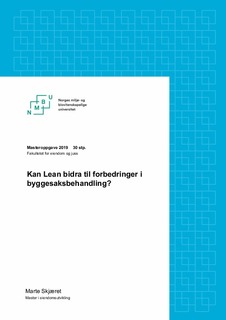| dc.contributor.advisor | Holsen, Terje | |
| dc.contributor.author | Skjæret, Marte | |
| dc.date.accessioned | 2019-09-06T12:38:06Z | |
| dc.date.available | 2019-09-06T12:38:06Z | |
| dc.date.issued | 2019 | |
| dc.identifier.uri | http://hdl.handle.net/11250/2612974 | |
| dc.description.abstract | Denne oppgaven har undersøkt om Lean kan bidra til forbedringer i byggesaksbehandling. Siden målet med byggesakssaksbehandling, i henhold til lov, er «å legge til rette for en prosess som er rask og effektiv, samtidig som hensynet til samfunnets rammer, forutberegnelighet, rettssikkerhet og kvalitet ivaretas,» ønsket jeg å se nærmere på om Lean kunne bidra i denne sammenheng. I den anledning har jeg først og fremst undersøkt Lean teori. Ytterligere forskning ble gjennomført ved hjelp av et konkret forskningsobjekt. Valg av forskningsobjektet falt på byggesaksbehandling i Bærum kommune. Dette skyldes at avdelingen både hadde anvendt Lean som et pilotprosjekt og som et eget transformasjonsprosjekt.
Forskningsopplegget som ble benyttet på objektet har vært todelt; objektet ble både undersøkt ved hjelp av dokumentanalyse og intervju. Dette betyr at studiet har vært basert på faktiske tall fra dokumentanalyser i tillegg til informantens egne tanker og erfaringer. For å danne meg et bilde av helheten har jeg forsøkt å knytte resultatene fra dokumentanalysen og intervjuet opp mot funn i Lean teori. Utvalgt teori er basert på oppgavens forskningsområde.
Resultatene viser at Lean kan bidra til en forbedret byggesaksbehandling. Dette skyldes at prosessen blir mer forutsigbar og effektiv, som et resultat av reduserte ventelister og kortere saksbehandlingstid. Viktige funn i oppgaven har vist seg å være at dersom Lean skal bidra til forbedringer i den kommunale byggesaksbehandlingen må begrepet tilpasses enkelte spilleregler. Eksemplar på dette er lover og regler som regulerer byggesak. Ut i fra forskningsobjektet har jeg også blitt oppmerksom på at visse forutsetninger må være oppfylt for å kunne oppnå den hele og fulle effekten av Lean. I lys av relevant teori har jeg sett nærmere på hvilke tilpasninger dette er samt årsakene bak forutsetningene.
Undersøkelsen legger vekt på at det er stor forskjell på en privat produksjonsfabrikk og kommunal tjenesteyting. I undersøkelsen har både forskjellene og tilpasningene vist seg å være avgjørende ved tanke på om og hvilke forbedringer Lean kan bidra med. Enkelte forebringer har også vist seg å være særegne nettopp på grunn av disse forskjellene. Ut i fra forskningsobjektet er økt tilgjengelighet og likebehandling av tiltakshaver eksempler på slike forbedringer.
Begrensningene i denne oppgaven skyldes manglende grunnlag til å kunne generalisere funnene. Dette skyldes at det kun har blitt benyttet et forskningsobjekt. | nb_NO |
| dc.description.abstract | This study investigates whether Lean can contribute with improvements for the consideration of building application. The purpose for the consideration of building applicationis, according to the law, is to facilitate a process that is fast and efficient, while taking into consideration of the society's framework, predictability, legal certainty and quality. Hence, it is relevant to investigate whether Lean can be an important improvement factor in the process.
For this purpose, this study begins with reviewing the literature regarding Lean methodology. Followed by collecting data from a real case of the municipality of Bærum, since they have used Lean during a pilot- and a transformational project on building applications.
The data collection on the municipality of Bærum was two folded, firstly, secondary data from online data bases provided this study with real numbers on the case of Bærum. Secondly, through interviewing a key participant from the municipality of Bærum, who shared his experiences and thoughts from using Lean in their process. Findings from both the secondary data and the interview was compared up against findings from the literature, in order to answer the research question.
The findings show that the consideration of building application can be improved by using Lean, as the process gets more predictable and efficiently, as a result of reducing waiting lists and the processing time. However, Lean needs to adapt to some rules in order to have an effect on this process, take laws and rules that regulates the consideration of building applications for instance. Additionally, findings also suggest that there are requirements to achieve the full effect of Lean, these are further explained with relevant theory for these assumptions and the reasons behind them.
This study also suggests that there is a big difference of Lean for a private production fabric and a municipal service, the differences and the adaptations are proved to be crucial in considering whether and what improvements Lean can contribute with. Simple improvements are also proved to be distinctive as a result of these differences. The case of Bærum implies that increased accessibility and equal treatment of project owners are examples of such improvements.
The limitations of this thesis relate to the lack of generalizing the findings due to the small sample of using one case. | nb_NO |
| dc.language.iso | nob | nb_NO |
| dc.publisher | Norwegian University of Life Sciences, Ås | nb_NO |
| dc.rights | Attribution-NonCommercial-NoDerivatives 4.0 Internasjonal | * |
| dc.rights.uri | http://creativecommons.org/licenses/by-nc-nd/4.0/deed.no | * |
| dc.subject | Lean | nb_NO |
| dc.subject | Byggesaksbehandling | nb_NO |
| dc.subject | Prosessforbedring | nb_NO |
| dc.title | Kan Lean bidra til forbedringer i byggesaksbehandling? | nb_NO |
| dc.type | Master thesis | nb_NO |
| dc.source.pagenumber | 113 | nb_NO |
| dc.description.localcode | M-EUTV | nb_NO |

